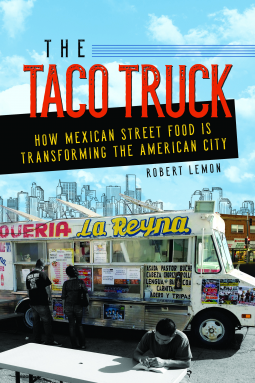
The Taco Truck
How Mexican Street Food Is Transforming the American City
by Robert Lemon
This title was previously available on NetGalley and is now archived.
Send NetGalley books directly to your Kindle or Kindle app
1
To read on a Kindle or Kindle app, please add kindle@netgalley.com as an approved email address to receive files in your Amazon account. Click here for step-by-step instructions.
2
Also find your Kindle email address within your Amazon account, and enter it here.
Pub Date 16 May 2019 | Archive Date 21 Jun 2019
Talking about this book? Use #TheTacoTruck #NetGalley. More hashtag tips!
Description
Drawing on interviews with taco truck workers and his own skills as a geographer, Robert Lemon illuminates new truths about foodways, community, and the unexpected places where ethnicity, class, and culture meet. Lemon focuses on the San Francisco Bay Area, Sacramento, and Columbus, Ohio, to show how the arrival of taco trucks challenge preconceived ideas of urban planning even as cities use them to reinvent whole neighborhoods. As Lemon charts the relationships between food practices and city spaces, he uncovers the many ways residents and politicians alike contest, celebrate, and influence not only where your favorite truck parks, but what's on the menu.
Advance Praise
"A fantastic book. I was repeatedly surprised by the numerous ways the author credibly links the act of mobile food vending to some of North America's most poignant contemporary issues of cultural identity. The mix of interviews, participant observation, and discourse analysis is a perfect fit for exploring the themes."--Joshua Long, author of Weird City: Sense of Place and Creative Resistance in Austin, Texas
Available Editions
| EDITION | Other Format |
| ISBN | 9780252084232 |
| PRICE | US$24.95 (USD) |
| PAGES | 256 |
Links
Featured Reviews
 catherine h, Reviewer
catherine h, Reviewer
This was kind of exciting to read! I like the food trucks making there way around towns these days! Every event- there they are! I love the idea that they grew out of these taco trucks. Of course taco trucks were all about basic, cheap food for migrant Mexican workers. Food trucks these days can be downright expensive! But the lowly taco truck story just grabbed me. I like the idea behind these trucks (just like the Texas chili ladies).Lots of food for thought in this book. I never would have linked food trucks to migrants and ties to a homeland. Great research Mr. Lemon! I enjoyed the book.
A deep dive into the origins and evolution of the taco truck, especially with the exploration of taco trucks' function as a unifier in today's society. Very interesting. Foodies will love this journey.
 Abby S, Reviewer
Abby S, Reviewer
Taco trucks have become an integral part of California’s food culture.This takes us into the origins of the taco truck . Word of mouth about the best taco trucks spreads like wildfire people will drive for hours to get to the location.Foodies taco truck lovers grab this book.. #netgalley #univ.ofillinoipress.
 Educator 242522
Educator 242522
I enjoyed this one and will pass it on to my urban sociology colleagues for their use as they help students explore the systems of cities.
 Monika S, Reviewer
Monika S, Reviewer
I live in Chicago so food trucks are something normal for me. On lunch break me and my coworkers always got to the long line for some delicious treats. When I saw this book I knew I had to read it and I am glade I did because author really went above and beyond with the history and all the details behind this little, good smelling truck. The book concentrates on taco trucks so there is also a lot of information about Mexican culture. Also evaluates three different metropolises in the United States: the Bay Area, California; Sacramento, California; and Columbus, Ohio.
Intriguing Investigation. This academic study of exactly what is a 'taco truck' - and yes, the author makes a very clear distinction between the original concept of a taco truck vs the food trucks so common in American cities and American media today - and how the practices of taco trucks enabled and evolved with and through the food truck revolution truly is extremely intriguing. The dry academic prose is a bit of a knock for a more widespread audience, which could benefit from reading the analysis here, but is surmountable - I personally used my Kindle Fire's text to speech option, and in that manner I was able to process the book far more readily. In particular, the various ways the taco trucks and later food trucks have anarchically evolved in each of the three markets studied was simply amazing to see, and the author's in depth knowledge of these issues - apparently he has been studying them for at least 15 years at this time - is readily apparent. Overall the dry academic prose isn't enough to take away from the history and strong analysis here, so it still rates as 5 stars.
 Michele B, Reviewer
Michele B, Reviewer
This book was insightful and interesting. Mr. Lemon brought forward so many new concepts and topics. I made so many notes on the most compelling points... the history of the taco truck in Mexican/Latino culture, how this culture dictates optimal truck locations, how even well-intended organizations and regulations can push out the traditional taco truck. Finally, it becomes clear why I couldn't find great chili in San Antonio! Finally, I understand why so few traditional taco trucks participate in food truck festivals, and why those that do seem to offer foods similar to Taco Bell. I would have given this book five stars except the author tended to look down his nose a bit with regard to "foodie" adventurers. The book left me a bit confused as to how to actually, effectively support the traditional taco truck, and whether my patronage would even help them. This book could have finished with more answers and a path forward -- then, it would have been a 5-star for me.
 Cristie U, Book Trade Professional
Cristie U, Book Trade Professional
This was a great book highlighting food trucks! They have really become popular over the past few years and this book went into details on what successful trucks do and do not do. I definitely recommend this one!
The taco truck and Latinos are synonymous with fast food, that is, mobile fast food. Having entered into an arena of cultural diversity, the taco truck struggled to find its niche in society. The author did a great job in framing the trials and tribulations faced by many of its vendors.
I offer my sincere thanks to NetGalley and Lerner Publishing Group for this ARC in exchange for an unbiased review.
The Taco Truck: How Mexican Street Food Is Transforming the American City, by Robert Lemon
I received this complimentary book via Net Galley and chose to review it. The following is my own, honest opinion.
Robert Lemon has a PhD in Geography from the University of Texas and is a lecturer and teacher. The Taco Truck, is an academic work. He outlines the history of the taco truck in Mexican culture and how it’s a appearance in the USA impacted on America, along with health and social reforms. He took the material from his PHd dissertation “Taco Truck Urban Topographies”. The resulting book was eight years in the making.
The taco truck began life as a mobile small food business, offering cheap authentic food, following Mexican immigrants around parts of America. They introduced, what have become universal favorites, like carne asada, chilli con carne, sour cream, guacamole, corn tortillas, maize pancakes, chilli beans, and tacos. They were the cheap staple foods that Mexicans had grown up with and loved.
Historically, taco trucks served the low waged, Spanish speaking immigrants during the day at their places of work at vineyards, construction sites and tomatoe groves. In the evenings they moved to public spaces at the Mexican barrios. They offered a culinary community where Mexicans far from home could interact with each other.
Slowly, Chicago, San Antonio, Los Angeles, Texas, California and San Francisco became the recipients of Mexican cheap eats, during the late 19th century and early 20th century.
Today there are over 4,000 gourmet taco trucks serving the USA. Mexico and the United States will be forever conjoined. This was a pleasant read and I feel well informed about this fascinating bite of culinary history.
 Denise S, Educator
Denise S, Educator
The Taco Truck is an amazing representation of history, culture, and food. It has a great introduction that sets the stage for what follows. It includes some frequent terminology which is great! I really enjoyed the history part that told of some important taco truck war stories.
 Jeanne Grace M, Reviewer
Jeanne Grace M, Reviewer
I received an Advanced Reader Copy from University of Illinois Press and NetGalley for my unbiased opinion of the book. This book is a history of Mexican culture and the birth of the taco truck. I found the book slow moving yet enlightening. I learned a lot and will never look at a food truck the same.
 Pia V, Reviewer
Pia V, Reviewer
It was an interesting book (not fascinating). It is definitely an academic work. Not the kind of book that I would read in one afternoon.But you can feel the passion of the author on the subject in every page. A lengthy study of the origin and evolution of the tack truck, with all it's cultural meaning.
Ah, the taco truck! From Portland, OR that's our thing. I love food trucks so when I saw this title I knew I had to read it. I'm not sure what I expected, but what I got was a history (fantastic!), the portion on city planning was interesting, and how taco trucks can bring a community together was enlightening.
Robert Lemon did his research on the taco truck and it shows. I came away with a more in depth appreciation of the taco truck.
In the end I liked the book, but a few things bothered me. 1) Maybe I was expecting a lighter read and this was tedious and academic at times 2) the footnotes in the middle of a paragraph disrupted the continuity of my reading.
Thank you NetGalley, University of Illinois Press, and the author Robert Lemon for the arc.
When I picked this book, I was expecting something completely different. Sorta like the vibes from the movie "CHEF". However, we got some major insights about how the Mexican Food Truck business came about. The history about it. The Mexican culture. The book focuses on three cities in the United States:
-Bay Area (Cali)
-Sacramento (Cali)
-Columbus (Ohio)
I also came to the realization of why a lot of food truck vendors avoid going to certain areas as well. Sometimes ICE agents are out there waiting for them, hoping to swoop in and take them in. In New York you have a abundance of food trucks as well. Not as many Mexican food trucks as I would like, but the diversity in food is ok. I love traditional food trucks the food is simply amazing and delicious. You can tell there's genuine love put into the food and you're supporting small businesses as well as a family. One thing I would've changed was the educational talk a bit and maybe focus on some personal aspect of food truck vendors instead. Otherwise this book was good. Thank You to Netgalley for providing me with a copy of this book in an exchange for an honest review.


















